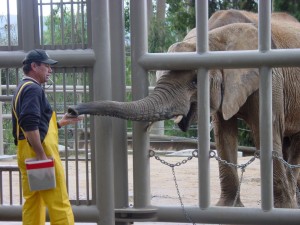Most of us have heard the controversy over whether animals live longer in captivity than the wild. But is this statement actually factual or just something they use to defend what they are doing? Or are the animals activists right in saying that animals in captivity, specifically elephants, life expectancy is decreased in zoos because of the lack of space as well as the lack of animals that can be kept at once.
In a study evaluating the life expectancy of African and Asian Elephants in captivity compared to those in the wild, researches found data proving the statement by zoos to be false. When comparing the life span of African Elephants living in European zoos compared to African Elephants living in Kenya’s Amboseli park, researches found that on average the elephants in the zoos lived 16.9 years, compared with 56 years for elephants who died of natural causes. When the research group conducted the test on Asian Elephants, they found similar results. When studying the elephants in zoos compared to elephants working in the Myanmar Timber Company, the group found that the animals in captivity lived to an average age of 18.9 years, while the ones working lived to an average of 41.7 years. This just proved the point that animals who live in captivity do not live as long as animals living in the wild.
When it comes to elephants in captivity, we need to look at what could be causing them to have a shorter life expectancy than their wild counterparts. One reason is the lack of family interaction. In the wild elephants live in groups as big as 100, while in zoos they are forced to live in groups of 2 or 3 at most. This lack of socialization eliminates the ability for the animals to make any sort of connection, like they do in the wild, because they are constantly being moved from one place to another. Another factor is the abuse they face while in captivity. In the wild elephants have no natural enemies. Humans however have even proven to be an enemy to captive elephants. There are even reports of zoo and circus elephants being beaten, shocked, and chained. These tactics are used to force the animals into performing the tricks you see them do in their circus acts. The stress these animals are forced to live with may be shortening their life span?

http://newswatch.nationalgeographic.com/files/2013/05/SanDiegoElephants7.jpg
In conclusion, the statement that zoos constantly make
that their animals live just as long, if not longer, than their wild counterparts is false. Numerous factors, including space, lack of socialization, and stress impact the life expectancy of the unfortunate
animals in captivity.
Is there something that zoos and circuses can be doing to prevent this? Would better care lead to a longer life expectancy? Only time will tell.


I used to think that we put those animals in to zoos or captivity in order to protect them. We want them to live longer and save the species. But the evidence provided by this articles actually prove that wrong. We think we give them the best condition and the safest environment, but they are wild animals. They have the ability to resist and survive in the wild, it’s in their body. This is a very good topic, it make me think about many questions. Do animals really benefit from captivity? or it’s actually human who get the benefit.
This article caught my attention because of my strong belief against animal cruelty. I, too, have heard the claim that “animals live just as long in captivity.” In order to prove or disprove this claim, a lot of work is required (as seen in the studies you used). I’m sure every zoo may have different tactics or methods as to how they treat their animals but there is no arguing that the animals held in captivity (elephants in particular) are deprived of social interaction and other freedoms they once had in the wild. Surely confounding variables are present in every case but there is no doubt that the overarching explanation for shorter life span in captivity is due to poor treatment. It would be interesting to study the psychology of elephants both captivated and wild. Is it possible for animals to become depressed, especially ones in captivity? Surely the status of an animal’s mental health must coincide with the length of their lifespan.
This is an informative post with solid evidence backing up the claim that elephants have a shorter lifespan living in captivity. When looking at this issue, it seems that we need to gain a better understanding of all of the factors involved in giving elephants a long life. For instance, could sanitation of zoos be an issue? Could the diet that the zoo supplies be unfit for keeping elephants healthy? There are many factors that zoos should be looking at while trying to make conditions ideal for their animals. Physical zoo limitations such as space certainly contribute to a lack of social involvement as you mentioned. But what about a lack of social life causes elephants to have a shorter lifespan? It is financially and ethically beneficial for zoos to look deeper into this issue and test the many variables to find the ideal situation for both the zoo and for the wildlife it contains.